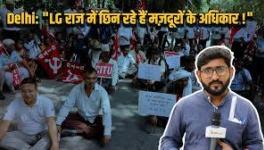Brazil's New President Presents Neoliberal Economic Plan.
Brazil is facing an extremely difficult political situation with unpredictable consequences. The resistance against the parliamentary and judicial coup d'état against President Rousseff has been growing.
Transcript
GREGORY WILPERT, TRNN: Welcome to The Real News Network. I'm Gregory Wilpert, coming to you from Quito, Ecuador.
It has been two weeks since Brazilian legislators took the historic step of removing Dilma Rousseff, the country's first female president, from office. The new president, Michel Temer, has now done good on his promise to return the country towards more neoliberal economic measures. On Tuesday, President Temer announced a series of privatizations and public-private partnerships that he says will help boost Brazil's struggling economy. These measures include privatizing four airports and two shipping ports, as well as increasing private participation in mining and oil production.
While social and labor movements are opposed to these measures, most notably with a general strike that is scheduled for September 22, everyone agrees that the economy is in trouble, which is in a severe two-year recession, and an unemployment rate of nearly 12 percent.
So, joining us from London to discuss these latest developments in Brazil is Alfredo Saad-Filho. Alfredo is professor of political economy at the School of Oriental and African Studies, University of London, and was a senior economics affairs officer at the United Nations Conference on Trade and Development.
Thanks for being on The Real News again, Alfredo.
ALFREDO SAAD-FILHO: Thank you, Greg.
WILPERT: So, clearly the economic measures that Temer just presented represent a move towards a more neoliberal economic direction of austerity and privatizations. What do you think this will mean in the short term? Do you think it will help Brazil get out of its recession? Will it help the people of Brazil? That is, what will be the plan's main effects?
SAAD-FILHO: Immediately the effect is primarily political; it's not economic. Brazil is in a desperate economic situation, with the country's economy contracting by almost 4 percent in 2015 and just as much this year. This is a disaster, and it means that the economic gains of the past ten years are essentially being wiped out as we speak.
Now, President Rousseff was removed from office by a coalition that is primarily neoliberal in economic character and nature. President Temer is implementing the economic program of this coalition.
Immediately, the idea is to bring in investment from domestic capital, and primarily from foreign capital. The extent to which this will be successful is questionable, because at the moment, with the economy essentially dead in the water, it is very difficult to imagine that there'll be a flood of new investment, either domestic or foreign in nature, pouring in to create new jobs. This is just not going to happen.
WILPERT: So it's these neoliberal measures. And you're saying that they're actually a continuation, actually, in many ways, of the Rousseff policies. Are there any social movements or parties in Brazil that are currently advocating for some kind of an alternative that could have a chance? I mean, first of all, what would an alternative look like? And is anyone advocating for that in Brazil at the moment?
SAAD-FILHO: Not in a well-articulated manner. One of the difficulties for the political left in Brazil during the past 12 or 13 years of rule by the Workers' Party, first under President Lula and then under President Rousseff, is that these governments were, by and large, implementing neoliberal economic policies, but neoliberal policies lite, neoliberal policies together with some income redistribution, neoliberal policies with social programs, neoliberal policies with rising wages and job creation. What we have at the moment is a turbocharged neoliberalism under President Temer, without job creation, with the economy flatlining and a significant increase in the number of unemployed. In this process, the left has become disarmed, and at the moment there is no organized economic platform to the left of the PT. And what the PT, the Workers' Party, can propose today is essentially a return to the neoliberalism lite of Lula and Dilma. So, from the point of view of developing an opposition platform, no, this is not happening.
What is happening at the moment--and this is gaining strength as we speak--is the rise of the political opposition to the Temer administration. So the government is finding it very, very difficult to articulate a political program, even more difficult to implement it and to lead it to success. That is at the moment not looking very good for President Temer.
WILPERT: So, as I mentioned in the introduction, there will be a general strike scheduled for September 22 that the unions and the MST, the Landless Workers' Movement, are supporting. And you also already mentioned that the government is going to be facing increasing opposition. I mean, what do you expect now to happen if these economic measures don't really solve the problems, which they're not expected to, according to what you say? What would be happening in the near future (and I'm talking about the next year or so), then, with regard to the political situation in Brazil? I mean, at some point people must be getting so frustrated that after having gotten rid of Rousseff--I mean by, of course, with this legislative coup-type situation, and now with Temer not being able to provide an alternative--obviously people have been clamoring for elections. Do you think that that's something that might happen at some point in the near future? What do you think is going to happen in terms of the political reaction to these policies?
SAAD-FILHO: Brazil is facing an extremely difficult political situation with unpredictable consequences. The resistance against the parliamentary and judicial coup d'état against President Rousseff has been growing. The Brazilian media has thrown a blanket of silence over it, but there was ten days ago a demonstration of approximately 100,000 people in São Paulo, and during the past weekend there were gigantic mass demonstrations in São Paulo, in Belo Horizonte, in Recife, in Salvador, and in another state capitals. Approximately 23 out of 27 state capitals saw large and growing mass demonstrations against President Temer, in most cases also claiming for direct elections for president now.
This is a very, very difficult political situation, very delicate for the government, because they do not have a mass base of support. The idea that what happened in Brazil was a coup d'état has gained traction, and this has now become common perception, common wisdom across the country. The government can count on its parliamentary base, but it is a parliamentary base that is very deeply fragmented and prone to collapsing on particular issues. And this collapse may become generalized if the government continues to demonstrate inability to deliver on its neoliberal promises. So the prospect not for the next year but for the next few weeks is very, very difficult to predict in Brazil, with the potential for escalation and deepening crisis.
In this political context, it is inconceivable that the Brazilian economy will start to pick up. So what the government can be facing very shortly is a deepening economic crisis, with political paralysis on top of it and with a mass movement demanding direct elections growing rapidly to its left. This is not a comfortable situation for the president.
WILPERT: Well, another development recently in Brazil is that on Monday the lower house of Congress voted to impeach the former speaker, Eduardo Cunha, who was also the person who initiated the impeachment process against Dilma Rousseff. But unlike Rousseff, though, he was removed by a far larger majority, with 450 to ten votes, and is accused of much more serious crimes--or, actually, Rousseff never was accused of a crime, but he's accused of high levels of corruption, including owning a bank account in Switzerland that holds $1.3 million, among other things. What impact do you think the removal of Cunha will have on Brazilian politics? That is, will his removal help the anticorruption investigations and bring more politicians to justice? Or does he represent a sacrificial lamb, as he's in a sense said, in order to kind of compensate for Rousseff's removal, and maybe to stop further investigation?
SAAD-FILHO: This was a high-stakes gamble by president Temer, supporting as he did the elimination from the political scene of his bold ally, Eduardo Cunha.
It's important to get the context. Eduardo Cunha was elected speaker of the Chamber of Deputies not because he was a nice man--quite the contrary. He was the funder of approximately 250 out of 500 deputies. He was directly responsible for funding their political campaigns. So it is inevitable that he had his hands on lots of different tills, and he had contacts with many powerful donors, primarily companies. And he would be in charge of significant amounts of money.
Now, he has been sacrificed because he was incredibly unpopular the country and it was very, very clear that he was involved in illegal financial transactions in Brazil, as well as in Switzerland. And the international dimension was important. Now, the government sacrificed him in order to gain a little bit of traction and a little bit of respectability.
The potential downside of this is that Eduardo Cunha's very close to present Temer, or used to be, at least, and he knows how the government engineered, the current government engineered the impeachment process against President Rousseff. Eduardo Cunha also knows everything there is to know about the funding schemes that support the vast majority of deputies in the Brazilian Congress. So, potentially many embarrassing revelations would come out of Eduardo Cunha and the book he has promised to write. But even before then, if he does a plea bargain with the judicial system, then the consequences could be devastating for the current administration.
WILPERT: So do you think this will help the fight against corruption in general? I mean, one of the problems really was that the possibility of having Rousseff removed would stop the corruption investigations. Now it looks like they will get a second wind, perhaps, and perhaps actually clean up Brazilian politics. Or would you disagree with that?
SAAD-FILHO: Oh, this is not going to happen. The Brazilian political system is corrupt in an institutional manner. Corruption is the way in which the political system functions, and it has been like this for decades, if not centuries. So there is no way that by eliminating one corrupt individual after another you will clean up the political system. You would need wholesale political reform and a reform in the way citizens interact with politics. This is not on the cards in Brazil at the moment.
But what has been attempted, what is being attempted--again, as we speak--is to channel the corruption investigations towards former President Lula: away from the establishment, away from the base of support of President Temer, who himself has been implicated in a number of corruption scandals, and towards President Lula. Why is this important? Because Lula is the most popular politician in Brazil. Should there be direct elections for president, Lula might win. It's not guaranteed that he would, but he might win those elections. And this is unacceptable to the politicians that have just overthrown Lula's chosen successor, President Rousseff.
So today Lula has been indicted for corruption--surprise--on a number of scandals that Lula's defense team and the Workers' Party say are completely fabricated. These are financially small, very, very small compared to the scandals involving many millions, tens of millions, hundreds of millions, sometimes billions of reals that involve other politicians. Those other scandals are not being investigated. So it is blatantly a political process driving those corruption investigations, which is another suggestion that the Brazilian political system will not become cleaner simply as a result of this judicial process.
WILPERT: OK. Well, unfortunately we're out of time, but we'll definitely get back to you again to see what happens in the coming weeks and months. And thanks again so much, Alfredo, for having joined us.
SAAD-FILHO: Thank you, Greg. Thank you very much.
WILPERT: And thank you for watching The Real News Network.
End
Alfredo Saad-Filho is Professor of Political Economy at the School of Oriental and African Studies (SOAS), University of London, and was a senior economic affairs officer at the United Nations Conference on Trade and Development. He has degrees in Economics from the Universities of Brasilia (Brazil) and London (SOAS), and has taught in universities and research institutions in Brazil, Canada, Japan, Mozambique, Switzerland and the UK. His research interests include the political economy of development, industrial policy, neoliberalism, democracy, alternative economic policies, Latin American political and economic development, and inflation and stabilisation.
DISCLAIMER: Please note that transcripts for The Real News Network are typed from a recording of the program. TRNN cannot guarantee their complete accuracy.
Get the latest reports & analysis with people's perspective on Protests, movements & deep analytical videos, discussions of the current affairs in your Telegram app. Subscribe to NewsClick's Telegram channel & get Real-Time updates on stories, as they get published on our website.














